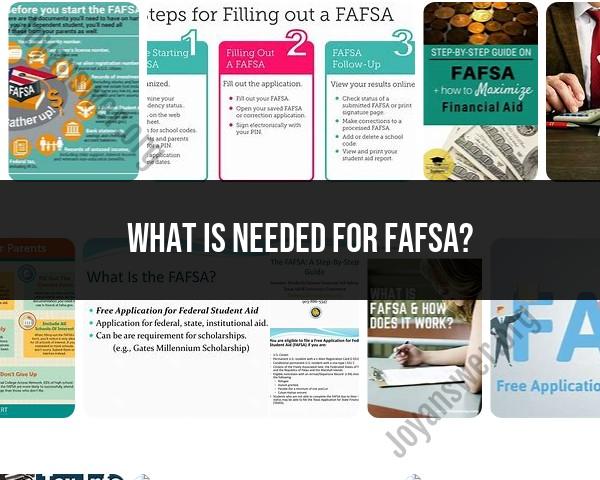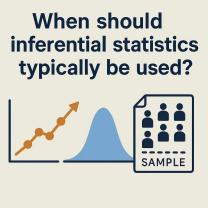What is needed for FAFSA?
When preparing to fill out the Free Application for Federal Student Aid (FAFSA), you will need the following information and documents:
Personal Information:
- Social Security Number (SSN) or Alien Registration Number if you are not a U.S. citizen.
- Date of birth.
- Legal name as it appears on official documents.
Financial Information:
- Federal Income Tax Returns: You and your parents (if you are a dependent student) will need your tax returns from the previous year. The IRS Data Retrieval Tool can simplify this process by transferring your tax information directly into the FAFSA.
- W-2 Forms or other records of income earned.
- Records of untaxed income, such as child support, interest income, and veterans noneducation benefits.
- Bank statements.
- Investment information.
Dependency Status:
- Information about your current marital status, as well as your parents' marital status, if you are a dependent student.
FSA ID:
- You and one of your parents (if applicable) will need to create a Federal Student Aid (FSA) ID. This serves as your electronic signature and allows you to access and sign the FAFSA online.
School Selection:
- You will need to list the schools to which you want your FAFSA information sent.
Selective Service Registration (for males aged 18 to 25):
- If you are a male between the ages of 18 and 25, you must be registered with Selective Service to be eligible for federal student aid.
It's essential to start the FAFSA early, as some financial aid programs have limited funds and may distribute them on a first-come, first-served basis. Be sure to check the specific deadlines for your state and the schools to which you are applying. Additionally, keep in mind that you need to complete the FAFSA each year you are seeking financial aid for college.
FAFSA Eligibility: What You Need to Know
The Free Application for Federal Student Aid (FAFSA) is your gateway to financial aid for college. Understanding what information you need, how to gather it, and how to submit it on time is crucial to maximizing your financial aid opportunities.
1. Identifying Required Information for FAFSA Eligibility:
General Eligibility Requirements:
- Citizenship:
- U.S. citizen or eligible noncitizen
- U.S. national
- Green card holder
- Arrival/Departure Record (I-94)
- Battered immigrant-qualified alien status
- T visa or parent with a T-1 visa
- Financial Need:
- Determined by the Expected Family Contribution (EFC)
- No income cutoff exists
- Family size and year in school are considered
- Enrollment Status:
- Enrolled in an eligible degree or certificate program
- Completing at least six credit hours per semester
- Making satisfactory academic progress
- Selective Service Registration:
- No longer required for males between 18 and 25
- Previously required for federal student aid eligibility
Additional Information Required:
- Social Security Number (SSN):
- Yours and your parents (if dependent)
- Alien Registration Number (ARN):
- If you are not a U.S. citizen or eligible noncitizen
- Driver's License Number:
- If you have one
- Federal Tax Information:
- Prior-prior year tax return information for you and your parents (if dependent)
- Bank Statements:
- Savings and checking account balances
- Investment Records:
- Stocks, bonds, and other investment holdings
Obtaining and Verifying Documents for FAFSA Completion:
Gather all required documents before starting your FAFSA application. This will ensure a smooth and accurate completion process.
Here are some resources to help you obtain and verify your documents:
- IRS Data Retrieval Tool:
- Pre-fills your tax information directly into the FAFSA
- Eliminates the need to manually enter tax data
- Reduces the risk of errors
- Federal Student Aid Website:
- Provides detailed information on required documents
- Offers helpful tips for gathering and verifying information
- College or Career School Website:
- May have specific requirements or deadlines for submitting your FAFSA
- Check their website for additional instructions
Ensuring Timely Submission of FAFSA to Receive Financial Aid:
The FAFSA opens on October 1st each year for the following academic year.
- Submit your FAFSA as early as possible after October 1st.
- Many colleges and universities have priority deadlines for financial aid applications.
- Submitting early increases your chances of receiving the full amount of financial aid you are eligible for.
Here are some additional tips for ensuring timely submission:
- Start gathering your documents early.
- Complete the FAFSA online.
- Save your FAFSA application frequently.
- Proofread your application carefully before submitting.
- Sign and submit your FAFSA electronically.
Additional Resources:
- Federal Student Aid Website: https://studentaid.gov/
- FAFSA Help Center: https://studentaid.gov/welcome/
- Federal Student Aid Estimator: https://studentaid.gov/aid-estimator/
By understanding the required information, gathering and verifying your documents efficiently, and submitting your FAFSA on time, you can maximize your chances of receiving financial aid for college and pursue your educational goals.












